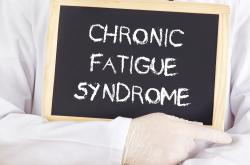Chronic Fatigue Syndrome
Not all fatigue comes under the broad heading of Chronic Fatigue Syndrome or CFS. Learn how to recognize CFS, what it feels like and what to do if you are diagnosed with this condition…

What is Chronic Fatigue Syndrome (CFS) and how is it different from ordinary fatigue?
The precise nature of CFS is still largely uncovered. It differs from ordinary fatigue in that it is of long duration (6 months or more) and that it prevents, or seriously hinders, the normal routines of life e.g. work, exercise, family life and social contacts. It is sometimes hard to diagnose as there is at present no gold standard test for CFS. The onset of CFS is usually gradual, although some sufferers can trace it back to a viral infection, which developed into a post-viral syndrome.
There is likely to be more than one cause of CFS. Additionally, many of the conditions, which accompany CFS (listed below), are interrelated. For example, damage to the liver is a contributing factor to immune system weakness, which in turn allows opportunistic infections to occur, which may further damage the liver. Distinguishing cause and effect is often problematic; some of the following conditions may provoke CFS or may occur as a result of it:
Viral infection
The Epstein-Barr virus (EBV) is often implicated in CFS. Originally thought to be the cause of the syndrome, it is now thought that it occurs more opportunistically as a result of a stressed immune system. Other organisms which have been proposed as causative agents in CFS (and are now thought to be opportunistic infections) include: Human Herpes virus type 6 (HHV-6), Inoue-Melnich virus, Brucella, Borrelia bugdorferi (Lyme disease), Cytomegalovirus (CMV), Enterovirus and Retrovirus.
Adrenal fatigue and hypothyroidism
Continuous stress depletes the adrenal glands. If you live a highly stressed life and do not set time aside for sleep, rest and exercise, you are likely to burn out sooner rather than later. This is particularly true if you use stimulants, such as caffeine, alcohol and sugar (or simple carbohydrates to keep going). Adrenal fatigue is tiring and often occurs with CFS. Some people with CFS also have hypothyroidism (underactive thyroid gland) as well. The thyroid regulates the metabolism of the body and, if hypothyroidism is not diagnosed and treated, it can lead to a lowered immune system.
Lowered immune function
The immune system is usually less effective in most CFS sufferers. This leads to frequent infections and re-activations of latent, lifelong infections. A depressed immune system can also lead eventually to serious illnesses, such as cancer. Strengthening the immune system is a crucial part of recovery from CFS.
Mineral deficiencies
An underlying magnesium deficiency can result in CFS or CFS like symptoms. Some patients also have low B complex levels as well as zinc deficiencies. Magnesium deficiency leads to poorer quality of sleep and less energy throughout the day.
Liver stress
Vitality and energy are determined by the health of the liver, which is perhaps the most important metabolic organ in the body. The liver is constantly de-toxifying numerous toxins that we ingest from food and from the environment. It supports the immune system, producing both lymph and special white blood cells known as Kupffer cells, which have been shown to engulf and destroy a single bacterium in less than one-hundredth of a second. The liver becomes stressed by alcohol and some prescription medications. Damage to the liver is often an underlying factor in chronic fatigue and CFS.
Candida
Fatigue is a common result of Candida (type of yeast) overgrowth. It is often caused by overuse of misuse of antibiotics, which cause the ‘good’ bacteria in the gut to die off, allowing Candida to multiply. Candida overgrowth can lead to leaky gut syndrome and poor absorption of nutrients.
Hypoglycemia
Many CFS sufferers also suffer from hypoglycemia. This is caused by insulin levels spiking when large amounts of sugar or refined (simple) carbohydrate is eaten. Although the carbohydrates provide a temporary boost, the effect is short-lived and, very quickly, energy levels drop.
What it feels like
Chronic fatigue syndrome has been likened to ‘feeling too tired to lie in bed’. Part of the reason for this statement is that CFS is frequently accompanied by fibromyalgia (FMS), which causes muscle and joint ache and pain.
Some of the symptoms include:
- Chronic, pervasive tiredness
- Flu like symptoms all the time
- Poor digestion and appetite
- Lethargy
- Waking up exhausted
- Headaches and joint pains
- Low grade, intermittent fever
- Poor memory and reduction of thinking skills
- Insomnia
What to do if you have chronic fatigue
If you have been diagnosed with CFS, you have to think about long term solutions, rather than quick fixes. It will take time to get well; just as it took time to get sick. Support yourself every step of the way, and notice the small improvements in your condition. There are various strategies which will help CFS. These include:
Dealing with viral infections
Viral infections can be tackled with several medications. This will make you feel better and be an encouragement to begin the lifestyle changes that dealing with CFS may require.
Improving the function of the immune system
Many experts believe that this is crucial for overcoming CFS. Getting the liver and the thymus glands to work at their most efficient is important. You may want to de-tox your liver by fasting and/or reducing your exposures to toxins. [Please seeTiredness and exposure to toxinsfor more on this.]
Sleep
Insomnia is common component of CFS. As well as creating a good sleeping environment for yourself (quiet, dark, cool room), it is also important that you prepare yourself for sleep. Avoid heavy meals late at night, take a small snack before you sleep to prevent night-time hypoglycemia, and make sure that you relax in the hours before bedtime. [Please seeHow to raise the quality of your sleepfor more information.]
Improving nutrition
Improving your nutrition will help with any fatigue, whether it is caused by CFS or not. Make sure you take plenty of vegetables and fruit and avoid sugar and processed foods as much as possible. It is better to eat home-cooked meals, than going out to cafes and restaurants. Aim for a number of small meals during the day, rather than one or two heavy meals. Keep healthy snacks to hand so that you’re not tempted to eat sugary treats when you feel tired. [Please seeEating well when you’re tiredfor more information.] If you suffer from hypoglycemia, then it would be a good idea to look at theglycemic indexofcommon foods, so that you can make wise food choices.
Taking supplements
Improve your health by taking vitamin and mineral supplements. It’s common in patients with CFS to have a deficiency in Magnesium, so you may want to consider additionally supplementing Magnesium. [Please seeSupplements for tirednessfor more information.]
Cleansing the body of Candida
Candida leads to poor bowel health and impedes the absorption of vital nutrients. Try the anti-Candida diet for this condition. [Please seeCandida and fatiguefor more details.]
Lifestyle factors
As well as the above, your mental outlook will play an important role in your recovery. A positive mindset is crucial as there may be set-backs along the way. Developing patience with yourself will help your progress considerably and make the road to health a much richer experience.













Leave a comment